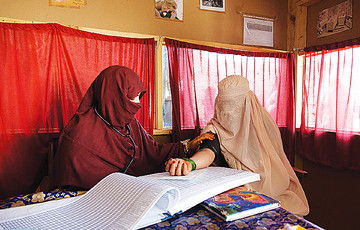
This is the story of Tirah Valley, a breathtakingly beautiful region nestled in Khyber District, roughly 100 kilometers from Peshawar. Rich in thick forests, lush meadows, healing springs, and majestic mountains, Tirah’s natural charm masks the long-standing suffering of its people.
For decades, the only news emerging from this area has been about military operations. No one knows when the air here will once again carry the fragrance of peace.
Tirah is home to several tribes and hundreds of thousands of people. Yet, it lacks even basic infrastructure, no universities, barely any colleges, and schools that exist only in name. If schools for boys are nearly nonexistent, one can only imagine the state of girls’ education. And where there’s no education, how can one expect the presence of female doctors?
Also Read: Three Security Personnel, Two Women Among Six Killed in South Waziristan Gunbattle
Music here is so taboo that no parent dares to name their daughter Ghazal. The notion of educating girls remains distant, buried under rigid traditions and a widespread ignorance of how deeply the region’s poverty and unrest are rooted in the absence of education. Without educated mothers, how can we expect an educated generation?
Now imagine the condition of healthcare in such a setting. Being from the medical field myself, I came across a story that not only reflects the helplessness of women in Tirah but also their quiet resilience, and the hope sparked by one extraordinary woman.
This story is about a remote village in Tirah where the healthcare crisis became painfully evident through a chain of maternal and infant deaths. The community realized that these tragedies wouldn't end unless they found a sustainable, local solution, a female doctor from their own soil.
Several years ago, the area's lone Basic Health Unit (BHU) had hired a Lady Health Visitor (LHV), but she soon left due to unavoidable circumstances. Once again, women were forced to rely on untrained midwives or male doctors. As the need for a qualified female healthcare provider became critical, something remarkable happened.
A fresh medical graduate, recently returned from London, decided to accept the challenge. Her choice baffled the hospital staff. They warned her to visit the region first before signing a contract, expecting she’d leave after one look. But she came back not to flee, but to stay, determined to serve the people as a true medical professional who had pledged to serve humanity.
Her first attempt to visit the area was blocked by security forces due to unrest. The next day, she made it through, only to encounter armed checkpoints. It was a harrowing introduction to the area’s dangers, including lack of basic amenities like internet, transport, and markets. Still, she remained undeterred, her courage nothing short of heroic.
But not everyone welcomed her. Some in the community couldn’t stomach the idea of a woman being this independent.
Rumors were spread, her character questioned. But reality struck hard when a medical emergency hit a household, a critical childbirth case that even traditional midwives couldn’t handle. The roads to Peshawar were impassable, and the only hope was this brave young doctor.
Despite the BHU not being equipped for deliveries, the doctor stepped in. She took charge, conducted the delivery, and saved both mother and child. That day, the people of the village saw her for what she truly was, a lifeline. They began to accept her, recognizing her courage, professionalism, and the values her parents had instilled in her.
Then came an incident both amusing and terrifying, a massive insect (locally called ghundal) invaded her room, causing a scene that resembled a spy thriller. She survived that too, because after all, she was a woman used to facing the worst.
Years later, the doctor applied for further studies in the UK. Her results arrived, excellent scores. She was set to leave for specialization and advanced practice. The village was filled with mixed emotions, pride for her success, sadness at her departure.
Today, 25 years later, in that same Tirah village, a female doctor named Malala Afridi serves the community. She was born during that emergency delivery and named after the very doctor who brought her into the world, a tribute of gratitude from her mother.
Tirah may still be far from perfect, but it found its first spark of change in a woman who dared to serve when no one else would. She didn’t just deliver babies, she delivered hope.